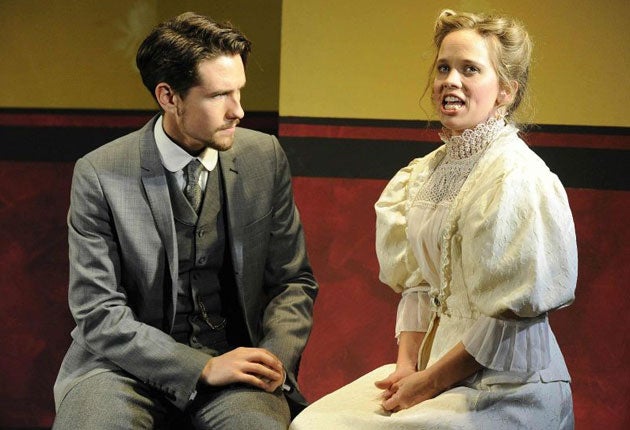Constance, King's Head, London

The King's Head have billed this production as "the world premiere of Oscar Wilde's Constance". Merlin Holland, the dramatist's grandson, has scornfully questioned the honesty of this, declaring that the piece should be described as "a play based on an idea by Oscar Wilde, written in French by Guillot de Saix, translated into English and further adapted by Charles Osborne". One thing is certain. The background to Constance is much more piquant than any of the dialogue delivered in Marc Urquhart's game, if rather ropey, staging.
The other indisputable point is that this play largely follows a scenario which Wilde, on his release from Reading Gaol, sold "exclusively" to a number of people, including the American actress Mrs Cora Brown-Potter. The claim that the script of Constance can, in any way, be attributed to Wilde rest on Brown-Potter's contention that she received a "developed" scenario from him. To what degree "developed"? Why did she do nothing with this prize possession? Given that the manuscript is lost or destroyed, the only evidence we have is an alleged French translation of it that appeared in Les Temps Modernes in 1954.
Mmm. All I can say is that if Wilde is the primary author of Constance, then I am Lady Augusta Bracknell and Dame Edith Evans combined. In a Sheridan-like screen scene, the titular perfect wife (creamy Ellie Beaven) overhears her self-made industrialist husband in an erotic tryst with a vampish vicar's wife. She saves him from exposure by some resourceful acting but in the process discovers herself and elopes to the Tyrolean Alps to live in virtuous sin with her real love, a poetically melancholic young duke. It's not just that the piece sounds like a tissue of recycled aphorisms or that the best line in it, that the English vice is "adultery with all home comforts", is snitched from the drama Frank Harris fashioned from the same scenario. It's that the play's spirit seems so un-Wildean in its anti-democratic snobbery. Two supposedly loveable old aristos bang on about social decline – defiance of convention being easier because "One can only be judged by one's peers and the true nobility, alas, are all in their graves". Are we to applaud the heroine's self-liberation as the snubbing of an upstart? If Wilde wanted us to think that, he must have been having a very off day indeed.
To 22 October (020 7478 0160)
Join our commenting forum
Join thought-provoking conversations, follow other Independent readers and see their replies
Comments